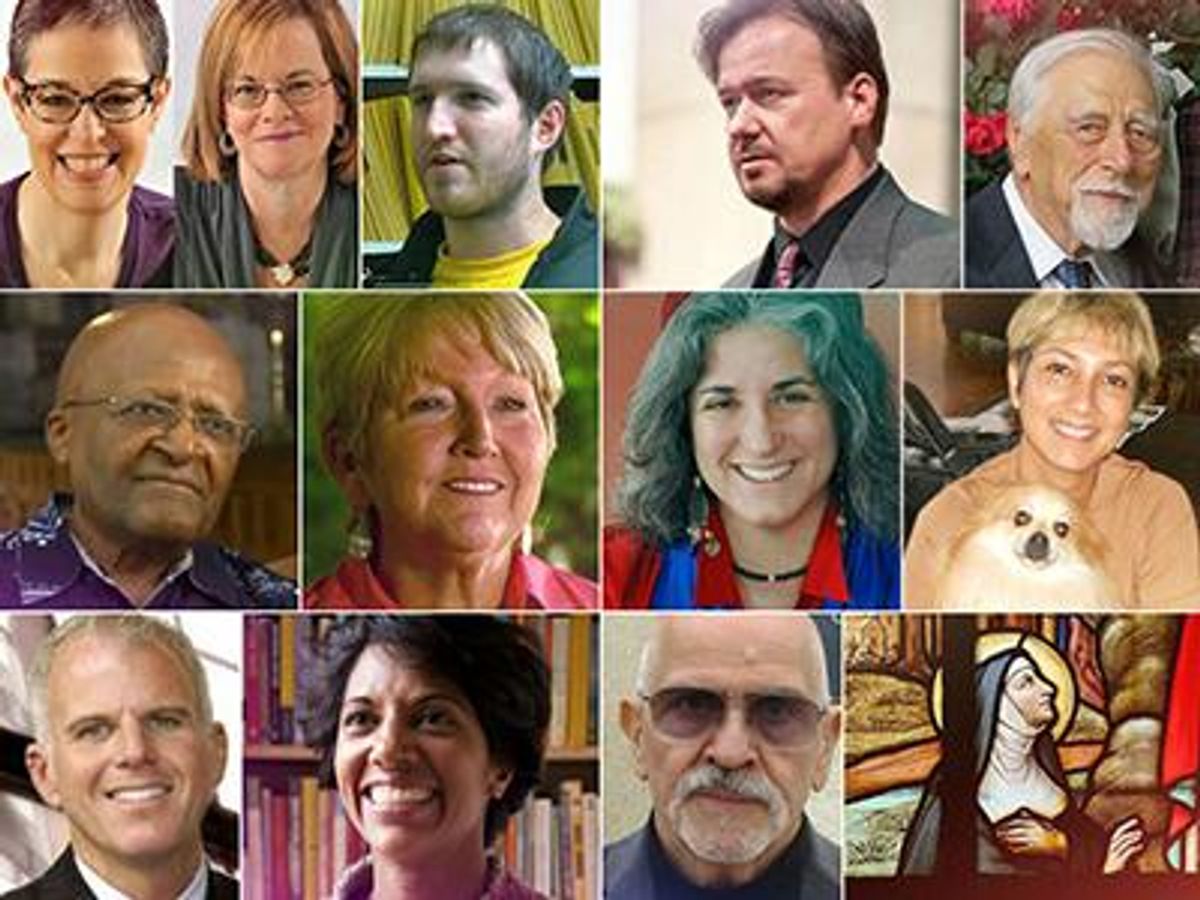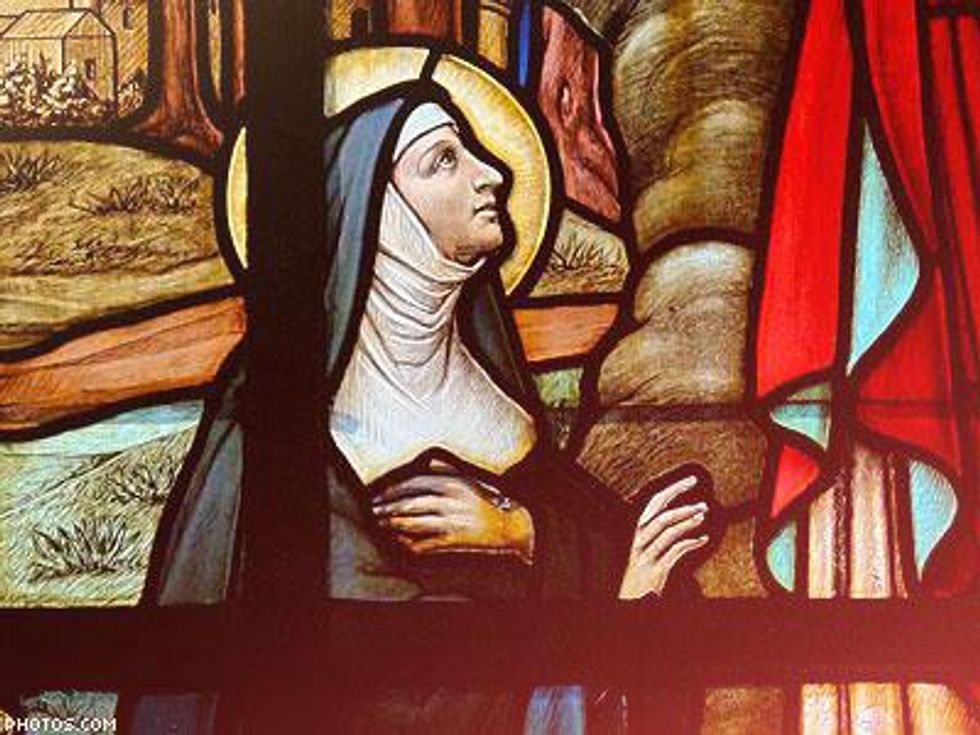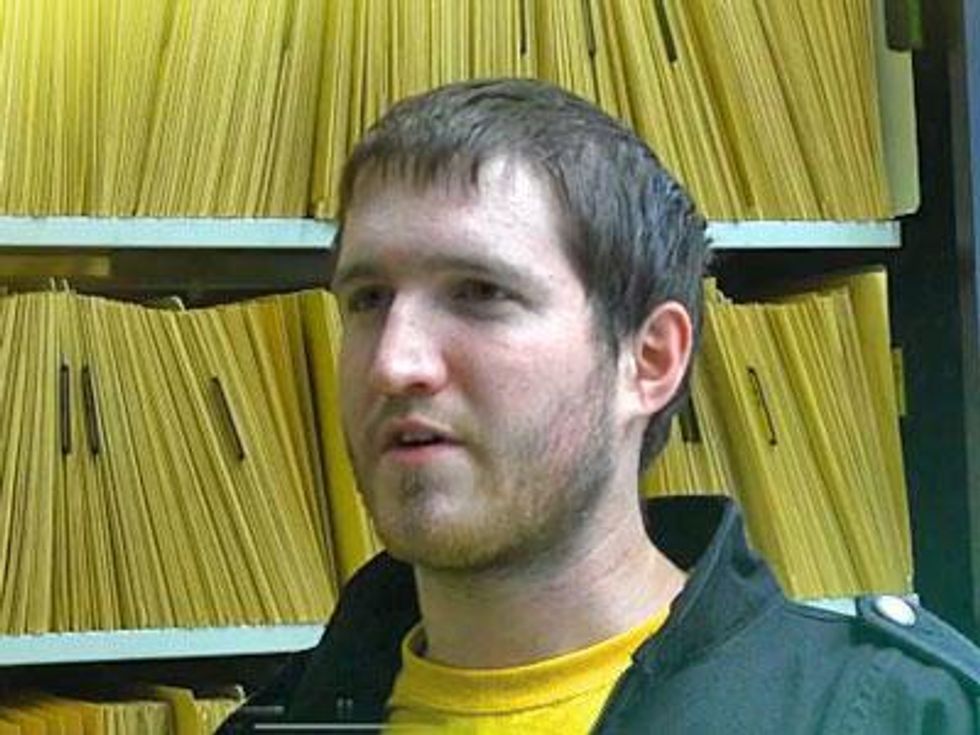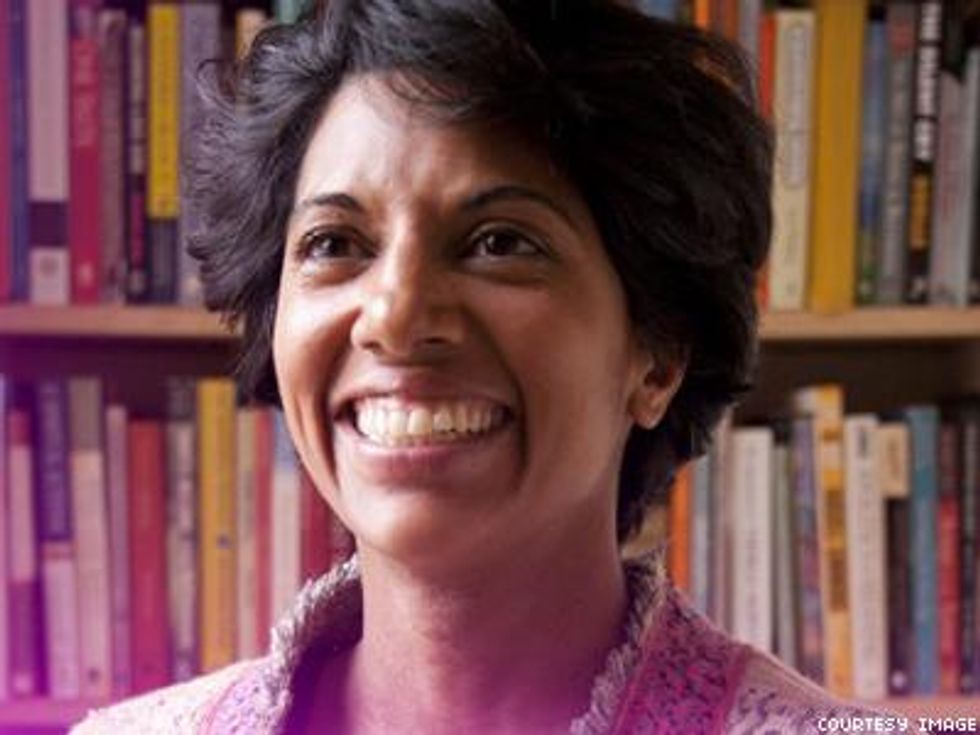OK, from Bryan Fischer to the Duggars, "sodomite semen" James David Manning, reparative therapy defenders, and even LGBT genocide supporter Steven Anderson, we've seen plenty of people take religiously motivated anti-LGBT stances this year.
But the news hasn't all been bad. Many LGBT and allied people are working to make the world, and in some cases their own religions, better for queer folks. Some advocate for social change, some for change within their denominations; others focus on ministering to and affirming LGBT people.
We decided to round up a list of religious folks who give us hope. We know that religions grew more LGBT-inclusive between 2006 and 2012; hopefully 2014 marked further steps forward.
 1. Rev. Frank Schaefer
1. Rev. Frank SchaeferThough eventually
reinstated, Rev. Frank Schaefer was initially defrocked by the United Methodist Church after performing a same-sex wedding -- which happened to be for his own son.
"The UM Church needs to find a way toward reconciliation, full inclusion of our LGBTQ community and an open altar for all God's beloved children. I will continue the fight alongside thousands of others in the reconciling movement for full inclusion and an open altar for all. I know the day is coming when this dream will be reality and I don't think it is that far in the future," Schaefer said in a statement when his reinstatement was affirmed in October.
 2. Rev. Chester Wenger
2. Rev. Chester WengerSimilarly. Chester Wenger was
stripped of his ministerial credentials for officiating at his gay son's wedding. Since he was already retired, his defrocking may be largely symbolic -- but coming from a 96-year-old Mennonite, an LGBT-affirming public statement is pretty cool.
"What would Jesus do with our sons and daughters who are bullied, homeless, sexually abused, and driven to suicide at far higher rates than our heterosexual children?" Wenger wrote in a column for The Mennonite. "We believe this is an opportune moment for the church to boldly proclaim a pastoral, grace-filled readiness to include both homosexuals and heterosexuals within the blessing of a marriage covenant designed to be wholesome and God-honoring."
 3. Rabbi Debra Kolodny
3. Rabbi Debra Kolodny
 4. Ani Zonneveld
4. Ani ZonneveldAs the founder of Muslims for Progressive Values, Zonneveld doesn't hesitate to take strong stances
advocating for change within Muslim communities and against anti-Islamic sentiment. A straight woman, Zonneveld has made supporting LGBT equality a priority for her group, which late last year obtained consulting status with the United Nations.
 6. Rev. Troy Perry
6. Rev. Troy PerryA longtime LGBT activist in Southern California, Rev. Perry
protested the antigay sign once displayed at Barney's Beanery in West Hollywood and was present for a historic police
raid at the Patch in Long Beach. And in 1968, he founded the Metropolitan Community Church--a Christian denomination conceived specifically as an outreach to LGBT people. Today, there are MCC churches in 22 countries, and Perry is
still advocating for LGBT inclusion and loves going "toe-to-toe" debating the Bible with those who come at him with the "clobber passages" often cited as justifying anti-LGBT prejudice.
 7. Marie Alford-Harkey and Rev. Debra W. Haffner of the Religious Institute
7. Marie Alford-Harkey and Rev. Debra W. Haffner of the Religious Institute Overall, the LGBT community has made tremendous strides, with states falling into marriage equality like so many dominoes and
transgender advocates making history for trans visibility. Like the transgender community, though, the bisexual community continues to face marginalization from both inside and outside LGBT spaces -- and bisexual people, whose very existence is called into question, continue to face erasure and invisibility. As
coauthors of the multi-aith Religious Institute book
Bisexuality: Making the Invisible the Visible in Faith Communities, Alford-Harkey and Haffner turned some much-needed attention to the experiences of bisexual people in religious bodies.
 8. The Mississippi Christians Featured in the "All God's Children" Ads
8. The Mississippi Christians Featured in the "All God's Children" AdsNotoriously conservative and dubbed the "
most religious state in America," Mississippi surely isn't an easy place to be out as an LGBT person (as confirmed by
L Word Mississippi: Hate the Sin). That makes it all the more bold for LGBT people and allies to speak out in the "
All God's Children" campaign. We're sure the campaign's stars--a transgender woman of color, a gay veteran, a minister, and a few parents -- will face some uncomfortable conversations at their grocery stores and in their churches. But they might help change everything for LGBT people in their state of residence.
 9. Zach Phelps-Roper
9. Zach Phelps-RoperThere's no excusing the antics of the Westboro Baptist Church, but we can surely muster sympathy for Fred Phelps's descendants, raised from birth in an environment
steeped in hate. Fortunately, some of the clan have fled the flock -- and this year, Zach Phelps-Roper, 23,
joined their number and embraced more loving views.
He told the Topeka Capital Journal that he feels "unconditional love for every person around the world" and that gay people were "among the most loving and supportive people he ... met" in the weeks after leaving Westboro.
 10. Archbishop Desmond Tutu
10. Archbishop Desmond TutuWhen it comes to taking a stand for equality, this isn't his first rodeo. Retired Anglican archbishop Desmond Tutu, who was a prominent opponent of apartheid in South Africa, this year called LGBT oppression "
the new apartheid" and said he was "absolutely, utterly and completely certain that God wouldn't be ... homophobic."
"You don't choose your sexual orientation. The Bible is the word of God. But it is the word of God through human beings," he told Ann Curry in an NBC News interview.
 11. General Synod of the United Church of Christ
11. General Synod of the United Church of Christ The United Church of Christ didn't just take
a stand; it took
the stand for marriage equality. Whereas anti-LGBT leaders often claim that legalizing same-sex marriage is a threat to religious liberty, the
General Synod of the United Church of Christ et al vs. Cooper lawsuit successfully argued that banning same-sex marriage interfered with the "free exercise of religion" in North Carolina.
"We are thrilled that the judge's order specifically recognized the religious freedom implications of this case and our clergy will be able to perform same-sex marriage ceremonies as faith practices call for without fear of prosecution," UCC associate general counsel Heather Kimmel said, according to an item on the UCC website.
 12. Taz Tagore
12. Taz Tagore
We know that some LGBT people face heart-wrenching issues with their families -- from denial to a lack of acceptance to the outright rejection (often religiously motivated) that lands many on the streets without a place to call home.
"Many [of these youth] feel negatively towards religion since it has contributed to their isolation from their family and/or homelessness," Taz Tagore told The Washington Post. A Buddhist who cofounded the Reciprocity Foundation, Tagore helps organize retreats where youth participants, she says, "are free to experience the retreats as secular or bring their faith backgrounds. ... Some say that retreats inspire them to pray again, or to be spiritual again."
 13) "God"
13) "God"OK, we don't really think that the "power(s) that be" behind "God's"
Facebook and
Twitter presences are the almighty himself/herself/itself/themselves, etc. And, admittedly, some of the posts carry some antireligion sentiment (perhaps satirically?). But if you have a sense of humor around religious issues, some of God's social media edicts are sure to make you giggle. (Sample post: "Give it up Church. State is just not that into you.") But where the almighty won us over was with the
God Loves Gays billboard project.
Per the successfully funded Indiegogo campaign:
"God is tired of having hate-speech put into his mouth by bigots. Therefore the LORD shall put up a billboard in Topeka, Kansas that declares to all that 'God Loves Gays!'"
Not only did the campaign succeed; it also hit stretch goals that raised money for organizations that fight homelessness and support LGBT youth. A heavenly move!


 1. Rev. Frank Schaefer
1. Rev. Frank Schaefer 2. Rev. Chester Wenger
2. Rev. Chester Wenger 3. Rabbi Debra Kolodny
3. Rabbi Debra Kolodny 4. Ani Zonneveld
4. Ani Zonneveld
 6. Rev. Troy Perry
6. Rev. Troy Perry 7. Marie Alford-Harkey and Rev. Debra W. Haffner of the Religious Institute
7. Marie Alford-Harkey and Rev. Debra W. Haffner of the Religious Institute  8. The Mississippi Christians Featured in the "All God's Children" Ads
8. The Mississippi Christians Featured in the "All God's Children" Ads 9. Zach Phelps-Roper
9. Zach Phelps-Roper 10. Archbishop Desmond Tutu
10. Archbishop Desmond Tutu 11. General Synod of the United Church of Christ
11. General Synod of the United Church of Christ  12. Taz Tagore
12. Taz Tagore  13) "God"
13) "God"















































































